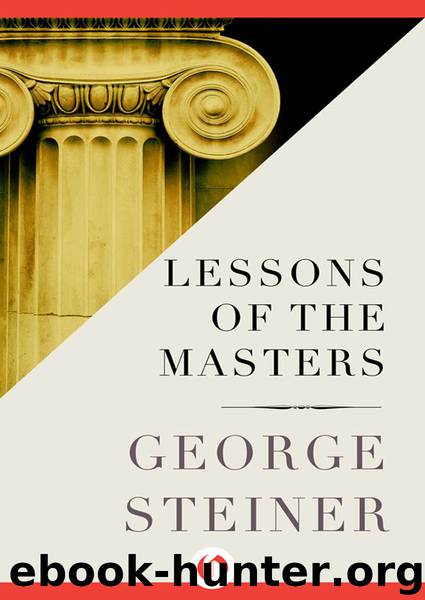Lessons of the Masters by George Steiner

Author:George Steiner
Language: eng
Format: epub
Publisher: Open Road Integrated Media
France had made of itself a république des instituteurs. Fundamental was the notion of the laïque, of a civic-pedagogic vocation as demanding in the secular sphere as had been that of the church and its teaching orders. Star figures in philosophy, in literature, in politics are lycée teachers during more or less extended periods in their careers: Jean Jaurès teaches, Mallarmé is a lifelong English master, Henri Bergson teaches in Angers and Clérmont-Ferrand, Simone Weil is institutrice to her alarmed provincial students, Jean-Paul Sartre is at the lycée in Le Havre. Rapture for the didactic can produce absurdities: in vocational classes, young women are taught the “rhetoric and poetry of housekeeping.” On any given day, one half of France seemed to be setting exams and concours for the other.
The underlying programme and ideal were, however, of the highest kind. As Jules Lagneau proclaimed in his lycée at Vanves: “we create in broad daylight, without any concealed motive, without any mystery, a militant lay order committed to private and social duty.” Explicitly or not, the model was that proposed by Fichte: culture is a branch of liberty, of moral and political freedom. This organic tie depends on schooling, on secondary schooling first and foremost. Each fully realised lesson in the classroom, however abstract or pragmatic its actual content, is a lesson in freedom. In any such lesson, as Plato reminds us, “the voice of the master is far more decisive than any book.”
In the république des instituteurs, Emile-Auguste Chartier was sovereign. He signed himself “Alain.” His was, unquestionably, a commanding presence in European moral and intellectual history. His influence permeated French education and significant elements in French politics from 1906, the year of Dreyfus’s rehabilitation, to the late 1940s. Alain’s prose possesses unsurpassed economy and clarity. His stoic integrity held generations of pupils and disciples spellbound. Comparison with Socrates became routine. Alain was “the sage in the city,” the Maître des maîtres. In addition to philosophical and political writings, in addition to essays on the arts and on poetry, such as his elucidation of Valéry’s La Jeune Parque, Alain published autobiographical reflections. L’Histoire de mes pensées of 1936 is a jewel. As are his meditations on war in Mars.
Yet the very name of Alain is virtually unknown in the Anglo-American world. Hardly any of his writings have been translated. Why should this be? I have no good answer. There is, no doubt, a problem of context. Alain’s Propos, the succinct but often highly wrought memoranda of which he published some five thousand in the daily or weekly press from 1906 to 1936—there is a hiatus between 1914 and 1921—touch on “universals”; but they do so with incisive reference to the immediate, to the political, social, ideological, or artistic occasion of the day. Alain’s brevities assume shared knowledge. For any outsider, for French readers after the second world war and the young today, the informing circumstance has faded. Alain’s texts, moreover, were resonant with his teaching voice. With the distancing, with the disappearance of the man, the life-giving force may have drained from the page.
Download
This site does not store any files on its server. We only index and link to content provided by other sites. Please contact the content providers to delete copyright contents if any and email us, we'll remove relevant links or contents immediately.
| Deconstruction | Existentialism |
| Humanism | Phenomenology |
| Pragmatism | Rationalism |
| Structuralism | Transcendentalism |
| Utilitarianism |
The remains of the day by Kazuo Ishiguro(8998)
Tools of Titans by Timothy Ferriss(8393)
Giovanni's Room by James Baldwin(7346)
The Black Swan by Nassim Nicholas Taleb(7129)
Inner Engineering: A Yogi's Guide to Joy by Sadhguru(6793)
The Way of Zen by Alan W. Watts(6614)
The Power of Now: A Guide to Spiritual Enlightenment by Eckhart Tolle(5781)
Asking the Right Questions: A Guide to Critical Thinking by M. Neil Browne & Stuart M. Keeley(5775)
The Six Wives Of Henry VIII (WOMEN IN HISTORY) by Fraser Antonia(5514)
Astrophysics for People in a Hurry by Neil DeGrasse Tyson(5189)
Housekeeping by Marilynne Robinson(4446)
12 Rules for Life by Jordan B. Peterson(4303)
Ikigai by Héctor García & Francesc Miralles(4274)
Double Down (Diary of a Wimpy Kid Book 11) by Jeff Kinney(4268)
The Ethical Slut by Janet W. Hardy(4251)
Skin in the Game by Nassim Nicholas Taleb(4248)
The Art of Happiness by The Dalai Lama(4130)
Skin in the Game: Hidden Asymmetries in Daily Life by Nassim Nicholas Taleb(4004)
Walking by Henry David Thoreau(3961)
